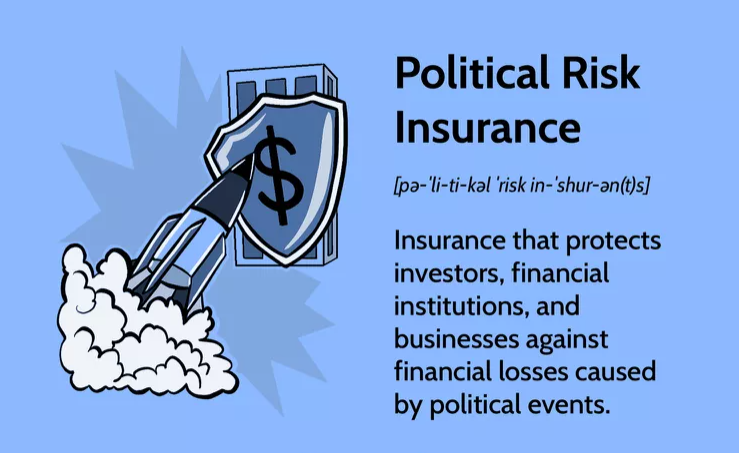In an increasingly interconnected global economy, businesses often expand into new markets to capitalize on growth opportunities. However, such ventures can be fraught with risks, particularly in countries where political instability, expropriation, or changes in government policies can threaten investments. This is where Political Risk Insurance (PRI) comes into play. This article explores what political risk insurance is, how it works, and provides several real-world examples to illustrate its significance.

Understanding Political Risk Insurance
Political Risk Insurance is a specialized type of insurance designed to protect businesses against financial losses that may arise from political events. These events can include:
- Expropriation: When a government takes control of private assets without adequate compensation.
- Political Violence: This includes war, civil unrest, terrorism, and riots that can damage property or disrupt operations.
- Currency Inconvertibility: When a government imposes restrictions that prevent businesses from converting local currency into foreign currency, impacting profit repatriation.
- Breach of Contract: Situations where a government fails to honor contracts with foreign investors.
Key Features of Political Risk Insurance
- Coverage Types: PRI can cover various risks, including expropriation, political violence, and currency risks. Businesses can select policies that align with their specific risk profiles.
- Insurer Types: PRI is often provided by private insurance companies, government agencies, and multilateral organizations such as the Multilateral Investment Guarantee Agency (MIGA), part of the World Bank Group.
- Premiums and Terms: The cost of PRI varies based on the country’s political risk profile, the nature of the investment, and the specific coverage terms. Businesses need to assess their exposure and determine the appropriate coverage level.
- Claims Process: The claims process for political risk insurance can be more complex than traditional insurance, often requiring documentation to prove that a covered event has caused financial loss.
How Political Risk Insurance Works
1. Risk Assessment
Businesses seeking to enter a foreign market begin by conducting a comprehensive risk assessment. This includes evaluating the political landscape, stability, regulatory environment, and any historical incidents that may indicate potential risks.
2. Policy Selection
Based on the risk assessment, businesses choose a political risk insurance policy that aligns with their investment strategy. They will work with insurers to customize coverage, including the types of risks to be covered and the duration of the policy.
3. Monitoring
Once the policy is in place, businesses should continuously monitor the political situation in the country of investment. Changes in government, social unrest, or economic instability can impact risk exposure.
4. Claim Filing
In the event of a triggering event, such as expropriation or political violence, businesses file a claim with the insurer. This process typically requires detailed documentation and evidence of the financial impact caused by the political risk.
5. Payout
If the claim is approved, the insurer compensates the business for the verified financial losses, allowing the company to mitigate damage and sustain operations.
Examples of Political Risk Insurance
Example 1: Expropriation in Venezuela
A major oil company invested billions in a joint venture in Venezuela, attracted by the country’s vast oil reserves. However, in the face of economic instability and political turmoil, the Venezuelan government nationalized the oil sector, expropriating the company’s assets without fair compensation.
Fortunately, the oil company had secured political risk insurance covering expropriation. As a result, they filed a claim and received compensation that helped offset their losses. This coverage allowed the company to minimize its financial damage and redirect resources to other investments.
Example 2: Political Violence in Egypt
During the Arab Spring in 2011, widespread protests and civil unrest in Egypt led to significant disruptions for many businesses operating in the country. A multinational corporation with a large manufacturing plant in Egypt faced extensive property damage and operational interruptions due to riots and political violence.
The corporation had previously purchased political risk insurance, which included coverage for political violence. Following the unrest, they filed a claim detailing the damages incurred. The insurer promptly processed the claim, providing funds that facilitated repairs and allowed the company to resume operations more swiftly than would have otherwise been possible.
Example 3: Currency Inconvertibility in Argentina
An American tech firm established a subsidiary in Argentina, drawn by the local market’s potential. However, following an economic crisis, the Argentine government implemented strict currency controls, preventing the company from converting local earnings into US dollars. This restriction severely impacted the firm’s ability to repatriate profits.
To mitigate this risk, the tech firm had acquired political risk insurance that included currency inconvertibility coverage. When the company filed a claim due to the government-imposed restrictions, the insurer compensated them for the losses incurred from the inability to access their profits.
Benefits of Political Risk Insurance
- Financial Security: PRI provides essential protection for businesses investing in politically unstable regions, reducing the financial impact of unforeseen political events.
- Enhanced Confidence: Having political risk insurance can boost a company’s confidence in entering new markets, knowing they have a safety net against political uncertainties.
- Facilitates Investment: Political risk insurance encourages foreign investment in developing countries, promoting economic growth and development.
- Risk Management: PRI is a critical component of an overall risk management strategy, allowing businesses to plan for uncertainties in their investment decisions.
Challenges and Considerations
While political risk insurance offers numerous benefits, businesses should consider some challenges:
- Cost: The premiums for political risk insurance can be significant, especially in high-risk areas, potentially affecting overall project viability.
- Complex Claims Process: The claims process may involve extensive documentation and negotiation, which can delay payouts.
- Limited Coverage: Not all political risks may be covered, so businesses must understand the terms and limitations of their policy.
Conclusion
Political Risk Insurance serves as a vital tool for businesses looking to navigate the complexities of investing in politically unstable regions. By providing financial protection against risks such as expropriation, political violence, and currency restrictions, PRI enables companies to pursue growth opportunities with greater confidence. Real-world examples highlight the effectiveness of political risk insurance in mitigating losses and ensuring business continuity in the face of unpredictable political events. As global markets continue to evolve, understanding and utilizing political risk insurance will remain essential for businesses aiming to thrive in a dynamic landscape.








